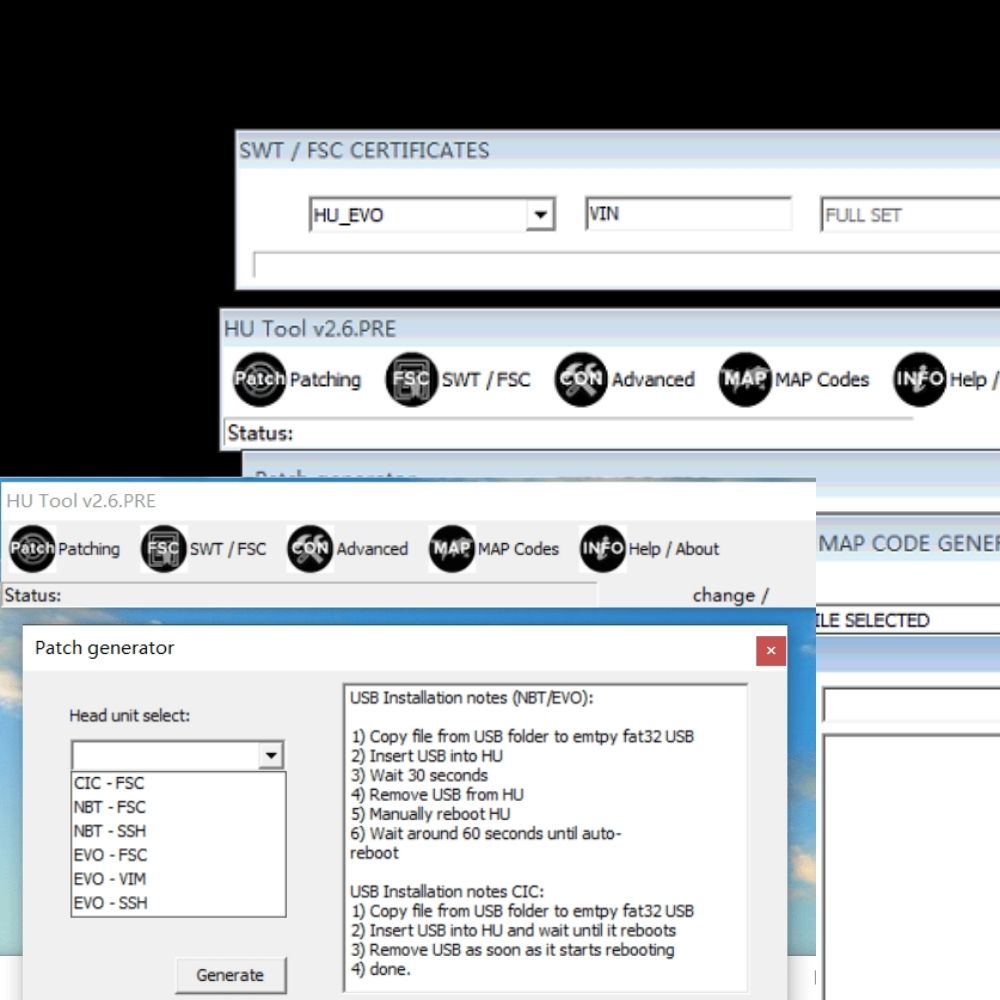
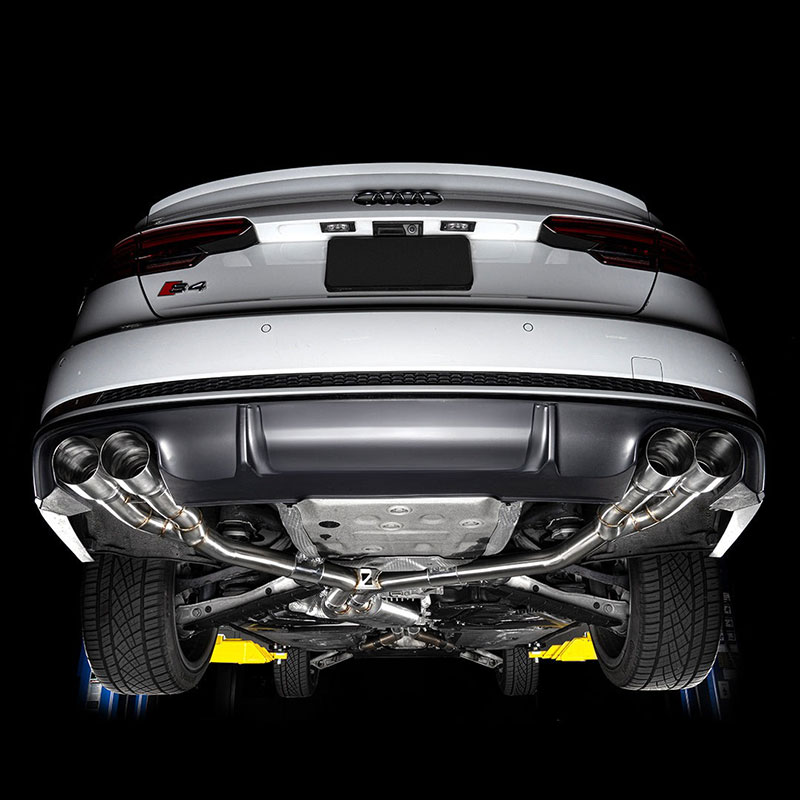
How the Audi Exhaust System Works & Common Issues to Watch For
The Audi exhaust system is more than just a pipe; it’s a complex network of components working together to control emissions, improve engine performance, and deliver that signature Audi sound. Understanding how this system works, from the catalytic converter to the muffler, is essential for any Audi owner, mechanic, or enthusiast.
Table of Contents
Toggle1. What Is the Purpose of the Audi Exhaust System?
The Audi exhaust system serves three key purposes:
A. Channel Exhaust Gases Safely
When the engine combusts air and fuel, it generates high-pressure exhaust gases. These gases must be safely routed away from the engine and the passenger cabin.
B. Reduce Harmful Emissions
The exhaust system minimizes environmental impact by converting toxic gases—like carbon monoxide (CO), hydrocarbons (HC), and nitrogen oxides (NOx)—into less harmful substances via catalytic reactions.
C. Optimize Engine Efficiency and Sound
A properly functioning exhaust system reduces engine backpressure, improving fuel efficiency and horsepower. Additionally, Audi uses specialized mufflers and resonators to create a distinct exhaust note—one of the hallmarks of the Audi driving experience.
2. Components of Your Audi Exhaust System
The Audi exhaust system comprises several key components, each playing a crucial role. Let’s delve into the details:
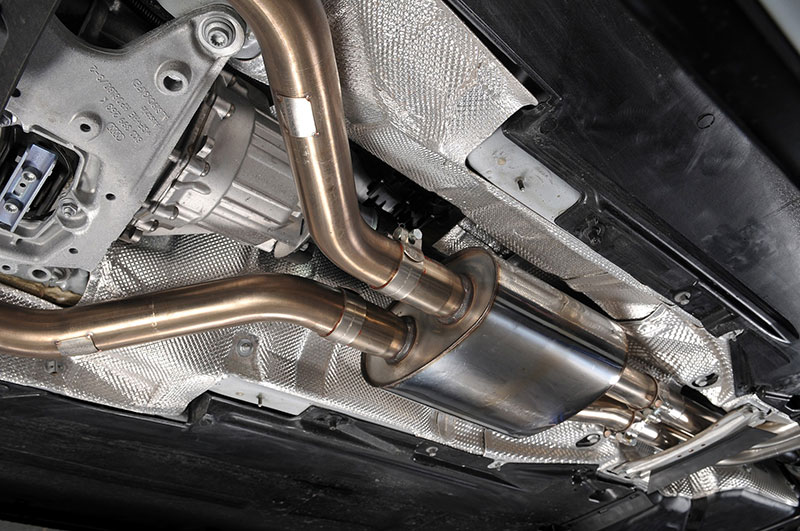
2.1. Exhaust Manifold
The journey of exhaust gases begins here. The exhaust manifold collects hot gases expelled from the engine cylinders and channels them into a single pipe. Think of it as the starting line of the exhaust system’s race track.
2.2. Catalytic Converter
This component is the emissions control champion. The catalytic converter uses chemical reactions to transform harmful pollutants like nitrogen oxides and carbon monoxide into less harmful substances before they leave your Audi’s tailpipe.
2.3. Exhaust Pipes
These pipes are the highways of the exhaust system, carrying the gases from the catalytic converter towards the muffler. They are designed to withstand high temperatures and pressures.
2.4. Muffler
The muffler is the sound engineer of your Audi. It’s designed to dampen the noise produced by the engine, giving your Audi its refined purr or growl, depending on the model.
2.5. Resonator
Working in harmony with the muffler, the resonator further refines the exhaust note by canceling out specific frequencies, contributing to a smoother, more pleasant sound.
2.6. Oxygen Sensors
These sensors are vital for engine performance and efficiency. They monitor the oxygen levels in the exhaust gases and relay this information to the engine control unit, which adjusts the air-fuel mixture accordingly.
3. How the Audi Exhaust System Enhances Performance
The Audi exhaust system is not merely a mechanism for emission control—it’s a key contributor to engine performance, responsiveness, and overall driving dynamics. Audi engineers take great care in designing exhaust systems that balance power delivery, turbo efficiency, acoustic tuning, and compliance with emissions regulations. Here’s a closer look at the elements and technologies that enable the Audi exhaust system to improve performance:
3.1. Minimizing Exhaust Backpressure
Backpressure refers to the resistance exhaust gases face as they exit the engine. Excessive backpressure makes it harder for the engine to expel spent gases, which reduces volumetric efficiency and power output.
Audi addresses this in several ways:
-
Mandrel-bent piping: Used in performance exhausts to maintain consistent diameter through bends, improving flow.
-
Larger pipe diameters: Turbocharged models like the Audi S4 or RS6 often use larger-diameter pipes to accommodate increased exhaust volume and turbo flow.
-
Optimized manifold design: Audi’s tubular stainless steel manifolds reduce turbulence and promote smoother flow into the turbocharger or catalytic converter.
Result: Reduced backpressure means better throttle response, more horsepower, and improved turbo spool times—especially noticeable in high-performance models.
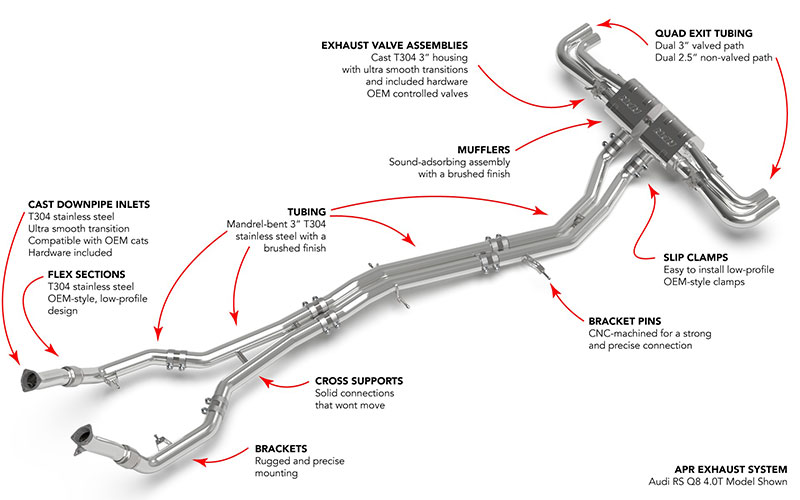
3.2. Turbocharger Efficiency Through Exhaust Routing
Audi’s popular TFSI engines are often turbocharged, and the exhaust system plays a crucial role in how effectively the turbo operates. Here’s how:
-
Hot-side turbocharging: In models like the 2.0 TFSI, the turbo is mounted close to the exhaust manifold, minimizing the distance hot gases must travel to spin the turbine. Less heat and energy is lost, improving boost pressure delivery.
-
Integrated exhaust manifolds (found in EA888 engines): These reduce turbo lag by maintaining higher exhaust gas temperatures and enabling quicker catalytic converter warm-up.
Example: In the Audi S3, the turbocharger benefits from a compact exhaust path, allowing the engine to deliver torque almost instantly, especially in mid-RPM ranges.
3.3. Variable Exhaust Valves (Audi Drive Select Integration)
High-performance Audi models—such as the RS5, SQ7, and S8—feature electronically controlled exhaust valves that adjust the exhaust flow and noise level based on driving mode.
-
Comfort mode: Valves remain closed or partially closed to reduce noise and prioritize cabin refinement.
-
Dynamic mode: Valves open wider, allowing gases to bypass resonators or muffler chambers, reducing backpressure and enhancing the exhaust note.
This system is directly tied to Audi Drive Select, allowing the driver to tailor the car’s exhaust behavior to match their driving mood—calm or aggressive.
Benefits:
-
Quieter rides during city driving.
-
Aggressive exhaust notes and reduced restriction under acceleration.
-
A dual personality that enhances both performance and luxury.
3.4. Exhaust Tuning for Engine Sound and Flow Dynamics
Exhaust acoustics are a major part of the driving experience in any Audi, especially in S and RS models. Audi uses components such as:
-
Resonators: Designed to cancel specific sound frequencies, reducing unwanted drone at cruising speeds.
-
Helmholtz chambers: Used to fine-tune exhaust tone in performance models by manipulating pressure waves inside the exhaust.
-
Sport exhaust systems: Optional on many models (e.g., RS3 or RS7), these provide a deeper, more aggressive tone while improving flow.
Audi even factors in the placement and shape of the exhaust tips, not just for aesthetics but also for sound projection and backpressure tuning.
Example: The RS7’s dual oval exhaust outlets are designed for both visual drama and tuned exhaust flow, contributing to the car’s brutal acceleration and signature growl.
3.5. Exhaust Gas Scavenging for Power Gains
Scavenging is the process of using high-velocity exhaust pulses to help draw spent gases out of the cylinder and pull fresh air-fuel mixture in. Audi enhances scavenging through:
-
Equal-length exhaust runners: Found in some high-performance engines like the 4.0L V8 twin-turbo, these help time pressure waves for improved cylinder evacuation.
-
X-pipes or H-pipes: Used in dual exhaust configurations to balance exhaust pulses between banks, increasing scavenging efficiency.
Benefit: Better scavenging equals more complete combustion, which means more power, smoother acceleration, and a cleaner burn.
3.6. Integration with Emissions and Engine Control Systems
Performance isn’t just about power—modern engines must meet strict emissions standards without compromising drivability. Audi’s exhaust system works closely with:
-
ECU-controlled EGT sensors (Exhaust Gas Temperature): Adjust fueling and boost to prevent component damage during aggressive driving.
-
Close-coupled catalytic converters: Positioned closer to the engine for faster light-off times, reducing cold-start emissions while maintaining flow.
-
Adaptive air/fuel mixture via O2 sensors: Ensures optimal combustion for performance and fuel efficiency, especially in dynamic driving.
Audi’s real-time control systems adjust ignition timing, turbo boost, and valve operation based on exhaust sensor data. This dynamic feedback loop allows the car to stay responsive while protecting the engine and exhaust components.
3.7. Performance-Oriented Aftermarket Exhaust Options
Audi enthusiasts often upgrade to aftermarket exhaust systems for more sound and power. Performance exhausts from brands like Milltek, Akrapovič, or AWE Tuning can deliver:
-
10–20 hp gains
-
Sharper throttle response
-
Weight savings (especially with titanium systems)
-
More aggressive, motorsport-style acoustics
However, Audi-designed performance exhausts already strike a balance between daily usability and spirited driving, which makes them an excellent baseline—even for tuners.
4.Common Audi Exhaust System Problems
Even the most meticulously engineered systems can encounter issues. Here are some common problems you might face with your Audi’s exhaust system:
A. Exhaust Leaks
Cracks or holes in the exhaust manifold, pipes, or muffler can cause leaks. These lead to:
-
Increased noise
-
Reduced fuel efficiency
-
Potential exposure to dangerous fumes
-
Failed emissions tests
B. Catalytic Converter Failure
The catalytic converter can become clogged or damaged due to:
-
Rich fuel mixtures
-
Oil burning
-
Age or overheating
Symptoms include sluggish performance, rotten egg smell, and check engine lights.
C. Faulty Oxygen Sensors
O2 sensors may fail due to contamination, carbon buildup, or wear. A bad sensor can cause:
-
Poor fuel economy
-
Engine hesitation or surging
-
Incorrect air/fuel ratios
-
Illuminated check engine light
D. DPF Blockage (Diesel Models)
A clogged DPF can cause:
-
Power loss
-
Increased fuel consumption
-
DPF warning light
-
Risk of limp mode activation
If regeneration fails, manual cleaning or replacement may be required.
5.Common Error Codes Related to Audi Exhaust System
The exhaust system in Audi vehicles plays a crucial role in managing emissions, optimizing engine performance, and reducing noise. When something goes wrong within this system, your Audi’s onboard diagnostics (OBD-II) will typically log a fault code. Understanding these codes can help pinpoint the problem faster and guide appropriate repairs. Below are some of the most common Audi exhaust-related DTCs (Diagnostic Trouble Codes):
5.1. Audi DTC P0420 – Catalyst System Efficiency Below Threshold (Bank 1)
-
What it means: This code indicates that the catalytic converter is not operating efficiently on the bank 1 side of the engine.
-
Common causes:
-
Worn or damaged catalytic converter
-
Faulty oxygen sensors (upstream or downstream)
-
Exhaust leaks near the O2 sensor
-
-
Symptoms:
-
Check engine light (CEL)
-
Decreased fuel economy
-
Failed emissions test
-
5.2. Audi DTC P0430 – Catalyst System Efficiency Below Threshold (Bank 2)
-
Similar to P0420, this code refers to the catalytic converter on the bank 2 side.
-
Important note: If both P0420 and P0430 appear, the issue may be related to the fuel system or both catalytic converters failing.
5.3. Audi DTC P0401 – Exhaust Gas Recirculation (EGR) Flow Insufficient
-
What it means: The engine control module detects insufficient flow in the EGR system, which is responsible for reducing NOx emissions.
-
Common causes:
-
Blocked or clogged EGR valve
-
Vacuum leaks
-
Carbon buildup in EGR passages
-
-
Symptoms:
-
Engine hesitation
-
Rough idle
-
Increased NOx emissions
-
5.4. Audi DTC P0471 – Exhaust Pressure Sensor Range/Performance
-
What it means: This code appears when the exhaust backpressure sensor is reporting values outside the expected range.
-
Common causes:
-
Faulty exhaust pressure sensor
-
Blocked DPF (Diesel Particulate Filter)
-
Damaged or restricted exhaust piping
-
-
Applies mostly to: Diesel models with DPF systems
5.5. Audi DTC P2002 – Diesel Particulate Filter Efficiency Below Threshold (Bank 1)
-
What it means: This is a common code on Audi TDI models indicating that the DPF isn’t filtering soot efficiently.
-
Common causes:
-
DPF saturation or failure
-
Issues with the regeneration cycle
-
Faulty pressure sensors
-
-
Symptoms:
-
Poor acceleration
-
Increased fuel consumption
-
Limp mode activation
-
5.6. Audi DTC P2279 – Intake Air System Leak
-
Relevance to exhaust: While this code directly relates to the intake side, leaks can affect O2 sensor readings and combustion efficiency, indirectly impacting the exhaust system.
-
Common causes:
-
Cracked intake hoses
-
Leaky PCV valve
-
Faulty throttle body gasket
-
6. Maintaining Your Audi Exhaust System
Proper maintenance can significantly extend the life of your Audi exhaust system. Here’s what you can do:
- Drive Regularly and Long Enough
Frequent short trips can prevent DPF regeneration and lead to condensation in the exhaust, accelerating rust.
- Use the Right Fuel and Oil
Always follow Audi’s recommended fuel type and engine oil specs to avoid damaging emissions components.
- Address Engine Issues Promptly
Misfires, oil leaks, or fuel injector problems can destroy your catalytic converter or DPF.
- Clean or Replace DPF as Needed
Diesel owners should monitor DPF health and allow regeneration cycles to complete uninterrupted. In some cases, a professional DPF cleaning may be required.
- Periodic Inspections
Have your mechanic inspect the exhaust system during oil changes. Look for rust, leaks, or loose hangers.
7. Common Question:
1. Why Is My Audi Exhaust So Loud?
A loud exhaust can indicate several issues, from a simple hole in the muffler to a more serious problem with the catalytic converter. Ignoring a loud exhaust can lead to further damage and costly repairs down the line.
2. How Much Does an Audi Exhaust System Replacement Cost?
The cost of replacing an Audi exhaust system can vary significantly depending on the model, the specific components needing replacement, and labor costs. It’s crucial to obtain quotes from reputable mechanics.
3. What Are the Signs of a Clogged Catalytic Converter?
Signs of a clogged catalytic converter include reduced engine performance, a sulfur-like smell, and potentially overheating. If you suspect a clogged converter, have it checked by a professional immediately.
“Regular maintenance and prompt attention to any issues are key to keeping your Audi’s exhaust system in optimal condition,” says master mechanic, Hans Gruber, from Bavarian Autohaus. “Ignoring small problems can lead to more significant and costly repairs later on.”
4. What is the function of an exhaust manifold?
It collects exhaust gases from the engine cylinders.
5. Why is my Audi exhaust smoking?
This could indicate a serious engine problem and should be addressed immediately.
6. How often should I have my exhaust system inspected?
At least once a year or as recommended by your Audi service schedule.
7. Can I upgrade my Audi exhaust system?
Yes, aftermarket exhaust systems are available, but ensure they comply with local regulations.
8. What is the purpose of a resonator?
It refines the exhaust sound for a smoother, more pleasant tone.
9. How can I tell if my oxygen sensor is bad?
Symptoms include decreased fuel efficiency and rough engine performance.
10. What does a rattling noise from my exhaust indicate?
A loose or damaged component, such as a heat shield or a broken internal part of the muffler.
Conclusion
The Audi exhaust system is a vital component of your vehicle, impacting performance, emissions, and sound. Understanding how it works and maintaining it properly will ensure a smooth and enjoyable driving experience. Regularly inspecting and addressing any issues promptly will keep your Audi running at its best.
When you need assistance, please contact AutoExplain via Whatsapp: +1(936)2896695, email [email protected] or visit us at 4590 Angus Road, New York, United States. Our customer service team is available 24/7.


BMW FSC Codes Explained: Full FSC Code List for F-Series
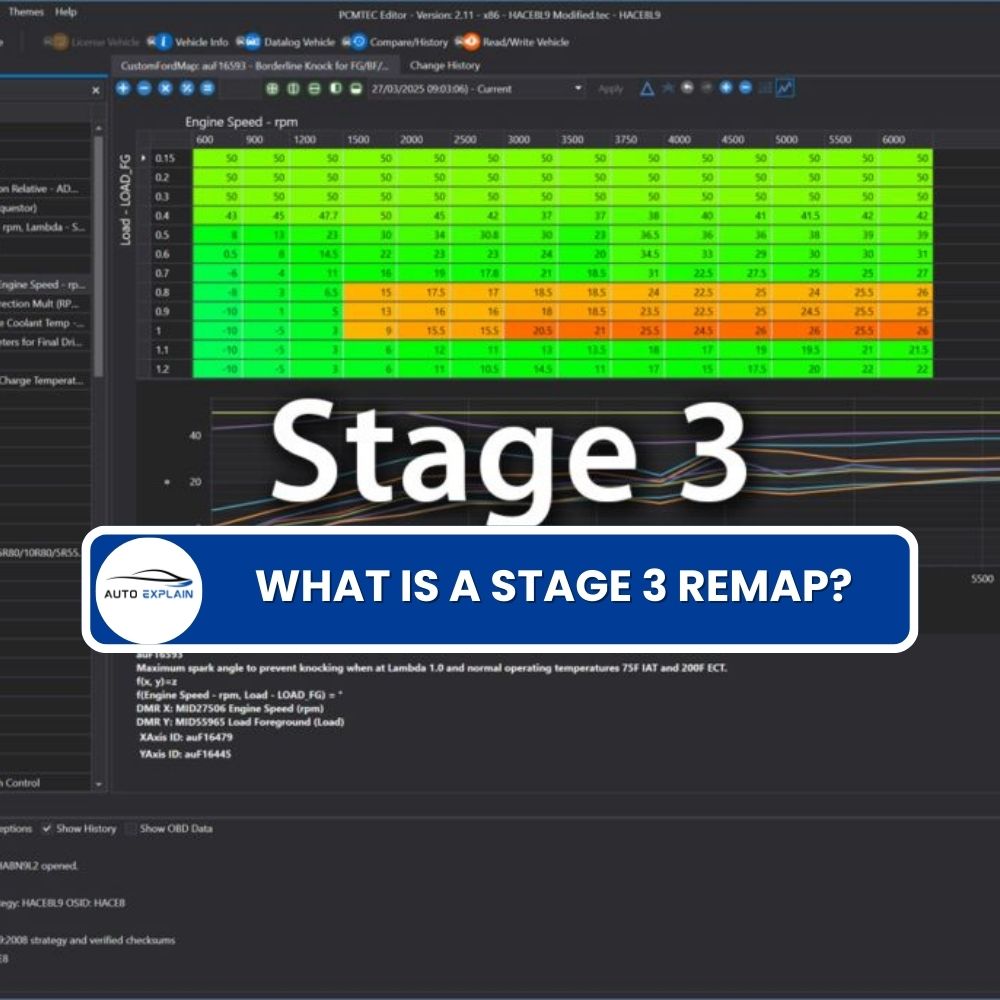
What is a Stage 3 Remap?

The Best Car Tuning Software in 2026: A Comprehensive Guide for Professionals








